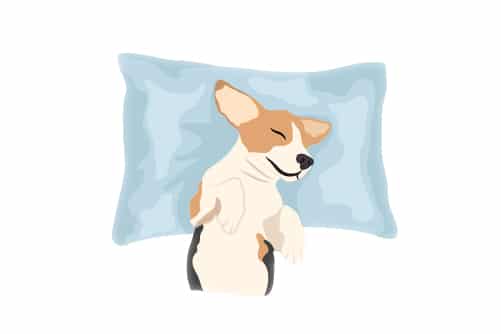
Healthy Dogs Need Proper Sleep, Too: How White Noise Can Help
About half of a typical dog’s day is spent sleeping. That proportion varies depending on factors like age, size, and breed type and can go much higher for puppies and larger dogs (up to 20 hours a day!). But unlike their pet parents, canines are flexible sleepers. They sleep in cycles throughout the day and often don’t sleep through the night. Because they spend less time in REM (deep) sleep than humans do, simple noises like footsteps, neighbors shuffling around, or trucks driving by can easily wake dogs out of their slumber. And like people, dogs require proper sleep to be healthy and feel rested and energetic. In the short term, sleep deprivation can cause our furry friends to become more sluggish and disoriented throughout the day and to whine, cry, or bark during the night. But over time and if left unaddressed, a lack of sleep can lead to the buildup of stress hormones, behavioral issues like aggressiveness, and even a weakening of their immune system.
These issues are never the best news for dog owners and can quickly become twofold if you yourself have sleep-related problems. Nuisance barking in the wee hours of the morning, which can also result from things like loneliness, boredom, or separation anxiety, is likely to make it much more difficult for you to sleep through the night. We all know that maintaining a healthy sleeping pattern is a vital component of both our short and long-term overall wellness, but we also know that our dogs contribute something very special to our lives. So if your pup is keeping you up or preventing you from getting the kind of sleep your body requires, it’s important that you find a coping strategy that restores peace to your nights.
Some pet parents rely on strategies like letting their dogs sleep in their bed, or at a minimum, in their bedroom. There is, however, an abundance of research throughout the years that has linked the use of soothing sounds to increased relaxation in dogs. A 2002 study conducted by animal behaviorist Deborah Wells, for example, concluded that dogs rested more and were more quiet when they listened to certain kinds of music (namely classical and reggae). And while there is less information out there about the effects of white noise on dog’s sleeping patterns appears, the outlook is promising.
For those who are less familiar, white noise can be similar to the sound of a radio tuned to an unused frequency. Alternate versions of it (like pink and brown noise) can resemble nature sounds like rainfall or ocean waves. In simple terms, white noise contains equal power across all the frequencies audible to the human ear—similar to the way white light contains all the wavelengths of the visible spectrum at equal intensity. When it comes to its functionality as a sleep aid, it works by masking sudden sound-related changes and producing a more consistent sonic environment. Because, while it may seem counter intuitive, it isn’t noises themselves that wake us (or our pups) at night, but rather sudden changes in the noises we process.
The benefits of white noise for both adults and children have been proven to extend far beyond just improved sleep. Its use has also been linked to improved memory and concentration, reduced ear ringing (tinnitus), and enhanced mental clarity. It’s difficult to imagine that our pups wouldn’t also receive multiple benefits from their preferred version of white noise as well.
So if you’re ready to experiment with white noise for improved sleep for both you and your favorite furry friend, it’ll be useful to know a few things about your dog’s body language—which is, of course, your best signifier for whether or not white noise is a sound solution for your household.
When a sound captures your dog’s attention, they’ll suddenly become very alert and their ears will likely perk up. Sometimes, they’ll turn their heads as they analyze what they hear. If the sound doesn’t bother them or doesn’t appear to be a threat, they’ll typically stop paying attention. But if the sound produces discomfort of any kind, they may start barking or growling in its direction. Particularly anxious dogs may whimper or try to hide. In that case, alternative solutions may be your best bet.
Like humans, dogs are all unique and their physical and emotional needs vary widely. The end goal is to find a happy place between a happy, healthy pet and a consistently peaceful sleeping environment in our homes. Most online testimonials about the use of white noise for dogs point to positive experiences, especially for dogs with anxiety, a difficult time sleeping, or separation issues. But if you have any reservations or concerns, the best idea is always to speak with your vet.

Don't just take our word for it.
We don’t take the term “sleep like a baby,” lightly. We know you don’t either. Want advice from a baby whisperer? Our sleep trainers understand.







